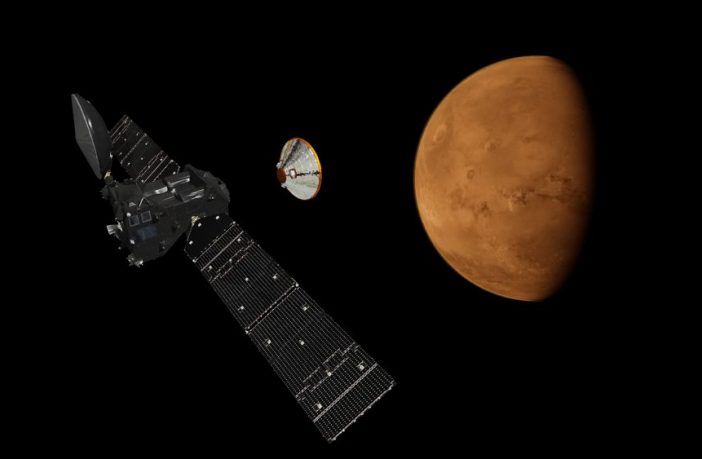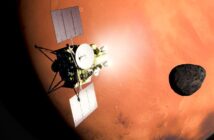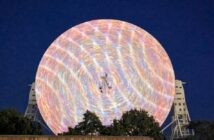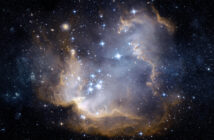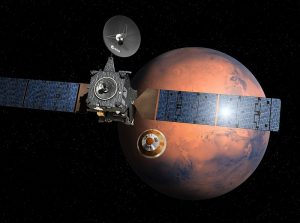
Schiaparelli separating from Trace Gas Orbiter. Image credit: ESA
Academics from the OU will be among those eagerly anticipating the first ever successful landing by European space scientists on Mars.
The team of scientists from the OU are part of the European Space Agency (ESA) ExoMars Mission, which will discover if methane gas exists in the atmosphere and below the surface. This will help scientists to answer the question of whether life has, or still, exists on our closest neighbour.
On Sunday 16th October 2016, the Schiaparelli Lander will jettison from the ExoMars Trace Gas Orbiter (TGO); by 4pm on Wednesday 19th October 2016, Schiaparelli should have landed, marking the first successful European mission to the surface of Mars.
‘Profound implications’
OU space scientist Dr Manish Patel is Co-principal Investigator for the NOMAD (Nadir and Occultation for MArs Discovery) Instrument on board the orbiter. He said:
ExoMars will prove that Europe has the technology and expertise to land on the surface of Mars, and will hopefully help to answer the question of whether there is (or has been) life on our closest neighbour. This could have profound implications throughout society. It has been a long journey towards this momentous point, just before we arrive on Mars. We have faced repeated financial, political and technical challenges, but have persevered as a team to make things work. To have been so involved in such a mission has been a fantastic experience.
Dr Patel and his team at the OU worked specifically on UVIS, a miniature spectrometer for detecting and quantifying trace gas and aerosol concentrations, which is part of the NOMAD Instrument. NOMAD consists of three spectrometers, two infrared and one ultraviolet, to perform high-sensitivity orbital identification of atmospheric components, including methane.
‘Perilous endeavor’
OU space scientist Dr Stephen Lewis is Co-principal Investigator for the AMELIA team that will receive initial data returned by Schiaparelli during its descent. He said:
Landing on Mars has always been a perilous endeavour, not least because Mars has an active atmosphere and weather. Understanding the atmosphere on Mars now, and how Mars’ climate has changed, is a key part of finding out whether the planet ever had a habitable environment and supports our understanding of our own climate.
The contributions by academics at the OU to the ESA ExoMars Mission and other space science research forms the basis of the undergraduate curriculum, including the MSc in Space Science and Technology. The ExoMars Mission is one of the achievements being celebrated during OU Space Month.
